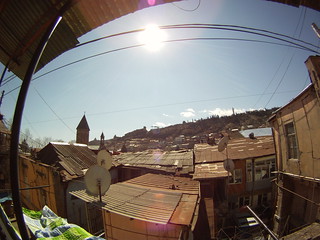 Its a Saturday morning and the sun is piercing the sheer white curtains in the massive windows next to this unfamiliar bed I find myself in. The screaming female voice in a language I do not recognize feels like its coming from under my bed. I thought I had dreamt it, but now seemingly awake, I hear a young male voice responding to what sounds like the stern words of a mother to a son. Above my head, the loud and unsteady footsteps of what sounds like a giggling toddler. Behind all this, just outside my window, someone attempts to start an engine that sounds like it is not willing to start, over and over. Pause. Repeat. It sounds like all of these people are in my room this morning. But they’re not. – This is old Tbilisi. Where the walls are thin and secrets are hard to keep. You may think you live alone, but you don’t really.
Its a Saturday morning and the sun is piercing the sheer white curtains in the massive windows next to this unfamiliar bed I find myself in. The screaming female voice in a language I do not recognize feels like its coming from under my bed. I thought I had dreamt it, but now seemingly awake, I hear a young male voice responding to what sounds like the stern words of a mother to a son. Above my head, the loud and unsteady footsteps of what sounds like a giggling toddler. Behind all this, just outside my window, someone attempts to start an engine that sounds like it is not willing to start, over and over. Pause. Repeat. It sounds like all of these people are in my room this morning. But they’re not. – This is old Tbilisi. Where the walls are thin and secrets are hard to keep. You may think you live alone, but you don’t really.
I step outside and Im almost run over by a 10 year old on her bicycle. She smiles as she turns to avoid me, a young sister runs behind her looking like she wants a turn to ride now. The corner grocer is chatting with an old lady, they pause to watch me walk by, both probably deciding Im another one of those occasional tourists that wanders through to look at the leaning houses and abandoned churches. When I arrive at Guriashvili Square, the old men are all huddled around the tables, I can barely see the dominoes on the table. The square is surrounded by some of the most beautiful abandoned buildings Ive ever seen, some of them decorated with political graffiti about democracy and property. Looking to the windows of a new hippy café, I can see they’re cooking up some vegetarian friendly food. I step inside and immediately get into conversation with the young bearded owner, yes this place is new, yes, it used to be a nightclub. Yes, someone got shot here but I don’t know the full story, it was in the crazy 90’s, everything was different then.
After finishing some of the finest healthy food I’ve ever had, I make my way up towards the TV tower. On my way there and back I make sure to take wrong turns. I find myself in people’s front yards and wandering through scary yet beautiful alleyways. When spotted, I just act like Im supposed to be there and I have no doubt in my mind where this alley leads me. The exact attitude I see in the face of other people I occasionally see along the way. A dad walking his daughter to school, a university student on his way to class, an old lady carrying plastic bags full of vegetables. I pass them all and soak in a sunny, normal day, in Georgia.
A good friend of mine who lives in Moscow tells me over a big Georgian dinner that night, “The great thing about Georgia, is that here you can taste real food, drink real wine.. everything has a more real flavor to it here.” I think about his words in every bite I take after that. There is definitely something to it, this genuine heart that the country has. As I wander home that night, I listen closely at the now hushed voices, Armenian, Georgian and other languages I can’t decipher, I can hear them all through the thin walls of these ancient homes. I smell the home cooked meals as I walk by the windows.
As far as national and international economics go, Georgia is said to be a dead end. But as far as life and its flavors go – Georgia is alive and well.
 For Levan Asabashvili, the key to fixing Tbilisi is working on the small but significant issues to eventually change the big picture. When he looks at the crumbling facades in old Tbilisi, he sees a reality that can be changed, and a city worth saving. His collective, Urban Reactor, are one group of Georgians that have dedicated themselves to this mission, with full knowledge of the social and historical obstacles that must be overcome.
For Levan Asabashvili, the key to fixing Tbilisi is working on the small but significant issues to eventually change the big picture. When he looks at the crumbling facades in old Tbilisi, he sees a reality that can be changed, and a city worth saving. His collective, Urban Reactor, are one group of Georgians that have dedicated themselves to this mission, with full knowledge of the social and historical obstacles that must be overcome.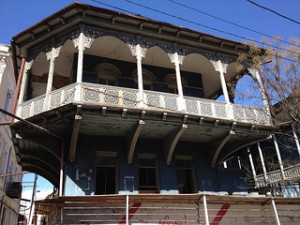
 Its a Saturday morning and the sun is piercing the sheer white curtains in the massive windows next to this unfamiliar bed I find myself in. The screaming female voice in a language I do not recognize feels like its coming from under my bed. I thought I had dreamt it, but now seemingly awake, I hear a young male voice responding to what sounds like the stern words of a mother to a son. Above my head, the loud and unsteady footsteps of what sounds like a giggling toddler. Behind all this, just outside my window, someone attempts to start an engine that sounds like it is not willing to start, over and over. Pause. Repeat. It sounds like all of these people are in my room this morning. But they’re not. – This is old Tbilisi. Where the walls are thin and secrets are hard to keep. You may think you live alone, but you don’t really.
Its a Saturday morning and the sun is piercing the sheer white curtains in the massive windows next to this unfamiliar bed I find myself in. The screaming female voice in a language I do not recognize feels like its coming from under my bed. I thought I had dreamt it, but now seemingly awake, I hear a young male voice responding to what sounds like the stern words of a mother to a son. Above my head, the loud and unsteady footsteps of what sounds like a giggling toddler. Behind all this, just outside my window, someone attempts to start an engine that sounds like it is not willing to start, over and over. Pause. Repeat. It sounds like all of these people are in my room this morning. But they’re not. – This is old Tbilisi. Where the walls are thin and secrets are hard to keep. You may think you live alone, but you don’t really. 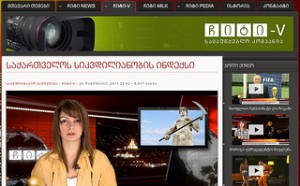
 Every nation needs someone to question, ciriticize, and even make fun of its own society. Even if people don’t always like it, making satire of the news is an essential way to unclog the social and political arteries, to prevent a detrimental heart failure. In the Republic of Georgia, there is no shortage of humor and rediculousness to be found, but chiti.ge doesn’t just go for the low hanging fruit… they see the value of pushing the so-called limits of what can and cannot be made fun of. My guest is Saba Lekveishvili, one of the people behind Georgia’s finest fake news program.
Every nation needs someone to question, ciriticize, and even make fun of its own society. Even if people don’t always like it, making satire of the news is an essential way to unclog the social and political arteries, to prevent a detrimental heart failure. In the Republic of Georgia, there is no shortage of humor and rediculousness to be found, but chiti.ge doesn’t just go for the low hanging fruit… they see the value of pushing the so-called limits of what can and cannot be made fun of. My guest is Saba Lekveishvili, one of the people behind Georgia’s finest fake news program.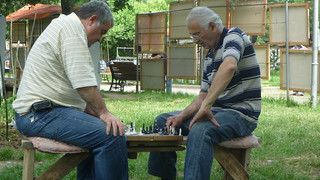 Almost a year since my first visit to the Republic of Georgia, I am back in Tbilisi, working here for one week. And while
Almost a year since my first visit to the Republic of Georgia, I am back in Tbilisi, working here for one week. And while
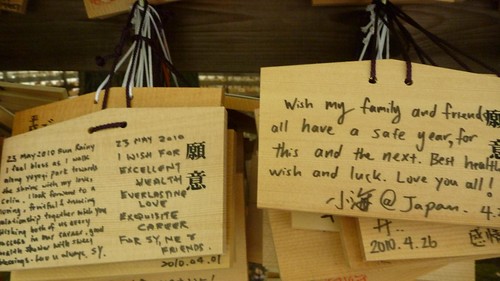 I had to read the sentence a few times out loud to friends in order to understand if I was getting it wrong:
I had to read the sentence a few times out loud to friends in order to understand if I was getting it wrong: